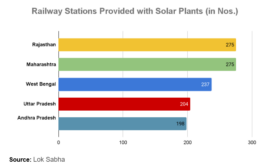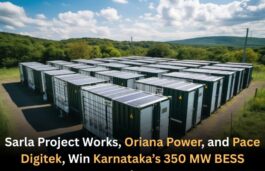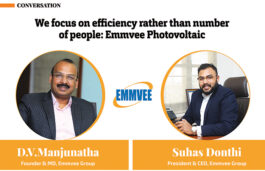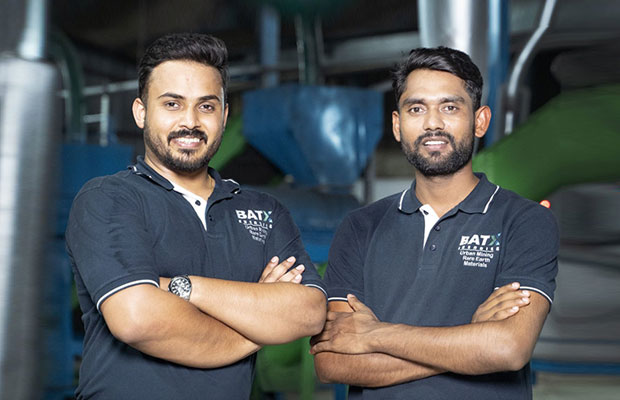
BATX energies is one of those companies which are truly a product of the times. Set up as a lithium recycling startup by co-founders barely out of college, the firm is firmly focused on the circular economy, as the energy transition gathers space. In the news recently for a fund raise, we caught up with the firm’s co-founder and CEO, Utkarsh Singh to understand where the form is headed.
SaurEnergy: Tell us about your journey so far? What have been the big learnings? What would you have done differently?
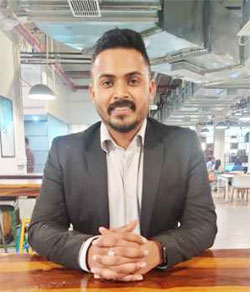
Utkarsh: We’ve had a fantastic journey, you know, my corporate career has been very small but as an entrepreneur, it has been very interesting because be it my education, as well as when I was working, I was always doing something on the side. A passion project, if you will. In the college days, I used to run a ride-hailing service from the campus, then I had a chain of fruit stalls that was spread all across the different universities. And during my office years, I was into a marketing service called Paper Planes, and then the company Blue roots, which was providing low-cost water filter systems for rural areas. But with BatX I have found a long term passion, because the company is growing very fast and at the right time, we are doing the right thing. The timing has been very important.
Do you plan to go for a fresh fund raise at some time?
Utkarsh: Six months down the line. The conversations have already started now we’re looking to raise somewhere around 15 million dollars next year, so half of that is already committed, but it will take another four to six months.
Coming to the second part of the earlier question, is there anything you could have done differently now that you finally proved your case to investors, had market success?
Utkarsh: Oh, yeah, of course, as entrepreneurs every day there’s learning. Yes, if you’d asked me yesterday I would have done a few things differently. And the biggest of them would be to really work more on the prototype initially and then go out for funding. So, we were very much ready with the concept. We did a prototype, but if you do the prototype and then the prototype will generate some revenues or interest you could get a better valuation, you know. In our case the concept was ready and we didn’t do much revenue. Valuations would have been higher with a little more effort on the revenue side perhaps.
So how much closer are you now to having long-term clients in place ?
Utkarsh: We are already operational and we are selling to the clients. Now we are doing a revenue of around Rs 2.5 cr per month and it’s growing rapidly and next quarter we are looking at a very high revenue of 5 to 6 million dollars.
Is it all about scaling up now?
Utkarsh: It is very interesting you know, the way that we will do the scale-up. So, as you understand we are into recycling batteries right now. Our key facility is in Greater Noida. But now we’re setting up small micro facilities all around the country where the batteries will be sourced locally and we convert them into powder. And then the powder will be brought to our main facility where we will do the chemical treatment. So, there are two simple reasons for it. First is because these batteries are hazardous and they are flammable so we don’t want to transport them over long distances. Secondly, is the economics of it. Beyond that, for expansion, we are already in touch with the French government to work with a partner in Nigeria and Mexico so we plan to take our technology to these geographies.
It’s almost like franchising it out.
Utkarsh: Yes, it is more of a partnership.
So, just for our readers, just how complicated is lithium-ion battery recycling? Is it very complicated and do you see India becoming a hub for this?
Utkarsh: Yes, lithium-ion battery recycling first of all is a technology and the various versions, because you have to deal with different technologies altogether. The mechanical part of dismantling it, and the chemical hydrometallurgy because there is not just one element there’s like different elements 5-7. India because of the kind of growth graph that we are generating on consumption is huge. Right now, it is around 20,000 metric tons and by the next 2-3 years, it will be around 55 to 60,000 metric tons. Eventually, we will be next to China when it comes to market size.
But currently, what is your scale in terms of reprocessing capabilities?
Utkarsh: Okay. So, right now, we are at 4000 metric tons (per annum) , which is amongst the top 3 facilities in India per annum, which is operational. As volumes are not so high yet, therefore you don’t need to put in a big facility right now, to become profitable, I think anybody who’s functioning around 200 metric tons per month and above can be profitable. So, it is a huge CAPEX, but the unit economics of it has to be profitable, that’s what we focus on.
Other battery recycling firms like Attero have announced huge plans going into tends of thousands of tonnes handling. Where do you see your own plans fit in?
Utkarsh: Yes, definitely. So, you can have big targets, but we have targets much more on the micro level because our mission is very clear that we want to reach some clear targets first and get absolute clarity on the issues. So, what we are focusing on is the reverse logistics supply chain. We are working at the grassroots level where we are hiring and training people like kabadiwala’s and all that, how they can, handle and retrieve batteries. We are tying up with different organizations who are into diverse knowledge and have more than 6 to 10,000 touch points for the collection of plastic waste, that then they will also start collecting. So it’s more about making people aware. So, that is what we are focusing on. I think this is a long-term plan, but it is a much more stable plan.
What is the cost of acquisition for you, for all these end of life batteries?
Utkarsh: To give you an idea, if I gave you the last month’s average per ton it is around three lakh rupees.
And what about the number, the number keeps changing regularly?
Utkarsh: Yes. So what has happened over the last year, it has grown exponentially to five years from now and it just goes like 10% up and down, up and down. It is all linked to commodity prices. We believe it will come down again. It is more about the market right now much more I’m driven by unorganized players. That is where BatX is much more focused on organizing.
Currently, our understanding was that stationary storage is contributing far more than automotive batteries. So, is that still the case or that set to change soon?
Utkarsh: So far if you see the graph most waste is coming from the electronic waste market. I would say it is around 85% of this graph that is available in India, I would say 10% is from the stationary storage, which is mostly from telecom. Automotive share is 5-10%, but it will go up in the coming years massively.
We have multiple technologies within lithium ion batteries, besides alternatives like solid state batteries that seem close to market now. So, when you hitched your wagon so to say to lithium-ion batteries, how confident are you that this will be a very long-term stable business?
Utkarsh: That advantage we have, is that both founders are technologists. So, we are the ones who created the technology. So, we have a very strong grip on the technology that gives us the leverage to engage much faster than any other organization. As our research team is already working on extracting the maximum value for any kind of technology though lithium-ion is going to stay for the next 10 years solid-state will come in the next four to five years on a commercial scale.
Again, as an entrepreneur having now seen this industry approach, what are the other opportunities you see, for other entrepreneurs to look at beyond recycling?
Utkarsh: The biggest opportunity that I would say, right now for entrepreneurs who want to get into this sector is the second-life lithium battery storage station repurposing. A study in China, where they’re recycling a lot they have built a market using second life batteries. The value proposition that entrepreneurs can focus on to make second-life products, you know, a specialized business is required, or a different kind of packaging is required. So, there is an opportunity in all of that and it’s a huge market.
And do you see BatX getting into that at some stage?
Utkarsh: Batx is already into it. As a company, we first established the base, so initially, we were into second-life application batteries. So, till that time we didn’t have enough money to set up the plan. So, we are already there and now but we’ll scale it up at a very big level.
How do you find recent government moves including the draft report on extended producer responsibility in the sector? Will they support healthy growth?
Utkarsh: The biggest point that the government has made and when we reduce, there are two things. The first one is every battery manufacturer has to take responsibility for their own batteries and the end of life. Right. So, let’s say today we are giving any batteries into the system. After three years I’ll have to be responsible enough to make sure that it has come back, that is where BatX is going to become your partner. The OEM (manufacturer) is much more focused on selling the first life package, and they need someone to collect it back and do the reverse process to a high standard, but at the same time, the same batteries can’t be sold to the same customers, right? So a high quality tracking and tracing system to track the life os a battery that we are working on, and will be pushing for adoption everywhere will certainly help support recycling as well as reassure customers on the source of their batteries.
How big can the recycling market be for supplies to manufacturers?
Utkarsh: The fact is that recycled materials will not cover more than 5 to 7% of the demand and supply in the entire world for the next five to seven years as the market is expanding very fast. But again, it is better than putting these batteries into a landfill. it is always good to maintain the circularity at least.
How big is your firm in terms of employees ?
Utkarsh: Right now, we have around 35 people on board and our hiring is going on so we will be closed by the end of this quarter.
And when you spoke to your investors, what was a three-year or five-year target in terms of top-line?
Utkarsh: So by next year it was around Rs 600 cr and in 2026 we will be doing around Rs 3000cr.
Since you studied in BML Munjal and are still operating from there how did that happen?
Utkarsh: So that has been a great point to us. So, in the new setup, material testing, and research where students want a chance to work at that lab and you know, we actually used to go and play around in the labs there. That gave us a new way to develop technology. Otherwise, the biggest barrier in this system is the technology development, right because you need to have access where we were able to, then, of course, we were also enrolled in the system. Now we have shifted to Gurgaon as a corporate office.
Your co-founder Vikrant Singh. How do you divide your work responsibilities?
Utkarsh: Our partnership has become more of a brotherhood. So, I take care of all the business functions, strategy part, and investment and he purely looks at innovation, research, and production.




